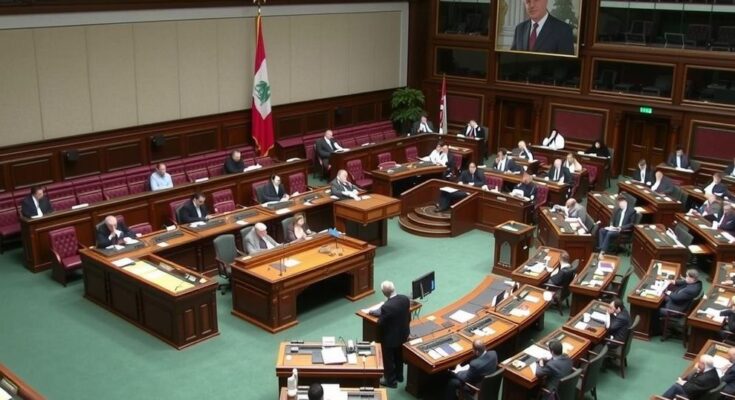Lebanon’s parliament is attempting to elect a president after a two-year hiatus, with Army Commander Joseph Aoun as the leading candidate. Previous attempts have failed, but there is cautious optimism for this vote amidst political shifts. As a constitutional barrier exists, Aoun would require a two-thirds majority to secure his position, underscoring the complexities of Lebanon’s political system.
On Thursday, Lebanon’s parliament is set to once again attempt to elect a president following a two-year vacancy. The favored candidate is Army Commander Joseph Aoun, who is perceived as the US and Saudi Arabia’s preferred choice. Previous attempts to fill the position, left vacant since former President Michel Aoun’s term ended in October 2022, have been unsuccessful, totaling twelve failed votes. However, there is cautious optimism that this attempt may succeed.
Joseph Aoun’s potential election represents a departure from Hezbollah’s earlier backing of Suleiman Frangieh, who recently withdrew his candidacy in support of Aoun. The complex sectarian power-sharing system in Lebanon has historically led to deadlocks in presidential elections. Furthermore, as a sitting army commander, Aoun is constitutionally barred from running for president, necessitating a two-thirds majority even in the second round of voting—a challenge amidst the current political landscape.
In addition to Joseph Aoun, other candidates include Jihad Azour, a former finance minister with the International Monetary Fund, and Elias al-Baysari, the acting head of Lebanon’s General Security agency. The election of a president is imperative for the appointment of a permanent prime minister and cabinet, as the current caretaker government is limited in authority. The next administration will face significant hurdles, including the ongoing economic crisis and the urgent need for reconstruction funds after the recent Israel-Hezbollah conflict.
The political stability of Lebanon is significantly influenced by its sectarian power-sharing system, which has historically led to prolonged deadlocks in government formation. This particular instance follows the end of Michel Aoun’s presidency, which left the position vacant for over two years, invoking concern over the future of the country’s governance. The Lebanese political landscape is further complicated by external influences and internal divisions, including the role of Hezbollah and its shifting support for presidential candidates.
As Lebanon prepares to vote on a new president, the stakes are high given the dual pressures of a political vacuum and a dire economic situation. Joseph Aoun’s candidacy has created a pathway for potential consensus among rival factions. Yet, constitutional obstacles and historical precedents set a challenging landscape, leaving the future of Lebanon’s governance uncertain as it seeks recovery from an ongoing crisis.
Original Source: www.hindustantimes.com




